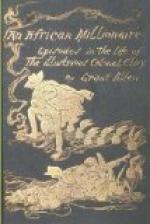Dr. Hector Macpherson looked across and intervened. “There is a part of my concession,” he said, “where we have reason to believe a perfect new Kimberley will soon be discovered. If at any time you would care, Sir Charles, to look at my diamonds—when I get them—it would afford me the greatest pleasure in life to submit them to your consideration.”
Sir Charles could stand it no longer. “Sir,” he said, gazing across at him with his sternest air, “if your concession were as full of diamonds as Sindbad the Sailor’s valley, I would not care to turn my head to look at them. I am acquainted with the nature and practice of salting.” And he glared at the man with the overhanging eyebrows as if he would devour him raw. Poor Dr. Hector Macpherson subsided instantly. We learnt a little later that he was a harmless lunatic, who went about the world with successive concessions for ruby mines and platinum reefs, because he had been ruined and driven mad by speculations in the two, and now recouped himself by imaginary grants in Burmah and Brazil, or anywhere else that turned up handy. And his eyebrows, after all, were of Nature’s handicraft. We were sorry for the incident; but a man in Sir Charles’s position is such a mark for rogues that, if he did not take means to protect himself promptly, he would be for ever overrun by them.
When we went up to our salon that evening, Amelia flung herself on the sofa. “Charles,” she broke out in the voice of a tragedy queen, “those are real diamonds, and I shall never be happy again till I get them.”
“They are real diamonds,” Charles echoed. “And you shall have them, Amelia. They’re worth not less than three thousand pounds. But I shall bid them up gently.”
So, next day, Charles set to work to higgle with the curate. Brabazon, however, didn’t care to part with them. He was no money-grubber, he said. He cared more for his mother’s gift and a family tradition than for a hundred pounds, if Sir Charles were to offer it. Charles’s eye gleamed. “But if I give you two hundred!” he said insinuatingly. “What opportunities for good! You could build a new wing to your village school-house!”
“We have ample accommodation,” the curate answered. “No, I don’t think I’ll sell them.”
Still, his voice faltered somewhat, and he looked down at them inquiringly.
Charles was too precipitate.
“A hundred pounds more or less matters little to me,” he said; “and my wife has set her heart on them. It’s every man’s duty to please his wife—isn’t it, Mrs. Brabazon?—I offer you three hundred.”
The little Scotch girl clasped her hands.
“Three hundred pounds! Oh, Dick, just think what fun we could have, and what good we could do with it! Do let him have them.”
Her accent was irresistible. But the curate shook his head.
“Impossible,” he answered. “My dear mother’s ear-rings! Uncle Aubrey would be so angry if he knew I’d sold them. I daren’t face Uncle Aubrey.”




